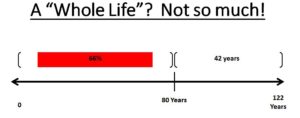More people now want to live to 100 or beyond. What’s up with that? Three thoughts from a future centenarian.

Nausea was a common reaction.
Derisive laughter and/or a cocked eyebrow were givens every time.
That’s what happened when I began to trumpet 5+ years ago, as I approached 75, that I was planning to live to 112 1/2.
Even my explanation for the unusual number didn’t allay the negative reactions to the prospect of living that long.
I set the target at 112 1/2 because I felt I would need another third of my life to get some things done that didn’t happen in the first two-thirds, which, by the way, were substantial.
Nearly everybody I shared my nutty goal with was repulsed by the idea.
I found it to be an effective tool to drive a stake into a lagging dinner conversation with my age cohort – conversations that more times than not evolve into “organ recitals” enumerating myriad aches, pains, surgeries, pending surgeries, and who is the latest to have developed Alzheimer’s.
My announcement wasn’t, and isn’t, an attempt at any form of sensationalism or “hey, look at me.” I set the target with the acquired awareness that there is no biological reason that anyone shouldn’t live to 100 or beyond.
Why not me?
After all, Madame Jean Calment of Arles, France set the benchmark for us and reinforced the possibility by living to 122 years and 164 days. Just because we can’t seem to get past 65% of that full-life potential, on average, doesn’t mean 100 or beyond isn’t a reasonable goal.

I wasn’t surprised then when a 2009 Pew Research Study revealed that only 8% of Americans expressed a desire to live to 100. A decade later, Dr. Ken Dychtwald reported in his book “What Retirees Want: A Holistic View of Life’s Third Age” that only 22% of Americans say yes to the idea, with the number dropping to only 17% for those over 65.
But what did surprise me was when a short time later, another Dychtwald report – which I referenced last week – points out something different entirely.
That report determined that, on average, 61% of retirees said they want to live to 100.
Why the reversal?
Is this faulty research and reporting or have attitudes toward aging shifted suddenly.
Let’s cut some slack for Pew Research and Dychtwald’s AgeWave organization. They’ve been doing extensive research in this field for decades.
So, what’s behind a shift in attitude away from nausea to welcoming.
I welcome your thoughts on what may be behind this. As you collect them, let me offer up three that come to my mind:
- The pandemic and its aftermath have turned on some lights. A sudden face-to-face encounter with the fragility and uncertainty of our mortality has cast a different light on the fleeting nature of time and the importance of finding a higher purpose and deepening relationships as we age. Maybe the helter-skelter scrambling lifestyle hell-bent on accumulation and built on shallow relationships and stressful, health-sapping work stress isn’t resonating so well. Maybe we are seeing some abandonment of all that in favor of wanting to make more out of what remains.
- The Betty White syndrome. Poor Betty tripped and fell right at the finish line, but weren’t we all rooting for her to make it? She and the growing number of healthy centenarians being publicized have begun to change attitudes toward hitting 100, demonstrating that getting to 100 doesn’t have to be about dementia, drool, and Depends or wheelchairs and walkers.
- Wisdom is taking hold. Perhaps we’re beginning to subscribe to the notion that it’s never too late to start and always too early to quit. Even though we may have screwed up our front nine with marginal lifestyle habits, we’re committing to a back nine/second half built on healthy, life-extending habits with the awareness that the body has amazing recuperative powers and is inclined to pay back in kind when provided with what it needs to function optimally.
A caution.
Don’t forsake today.
Even though I put 112 1/2 out in front of me, I’m increasingly aware of the essential nature of carpe diem and the dangers of living outside of today, be it in the past or the future.
Today is all we have.
Share your thoughts on this, please. Leave a comment below or email me at gary@makeagingwork.com. If you haven’t, join our email list and receive articles like this each week at www.makeagingwork.com. There’s an archive of over 200 articles there for your browsing pleasure.





Do you think that your goal of living to 112 1/2 will change when you celebrate your 112th birthday? Do you think you will regret putting an end date on your calendar? I think you should raise your goal to living to ” AT LEAST 112 1/2 +…..
When my Mom turned 100, The Today Show told me that they needed 6 weeks advance notice due to the number of requests they receive. I’m 75, work full-time, and have returned to college. I get a lot of skeptical looks from people and grief from my wife when I explain that retirement doesn’t interest me. To be honest, I’m seeking my next career adventure.
“I set the target at 112 1/2 because I felt I would need another third of my life to get some things done that didn’t happen in the first two-thirds.”
This is how it looks when you get there. Me personally, too long of a wait just for that.
https://www.dailymail.co.uk/news/article-10854879/Venezuelan-man-crowned-worlds-oldest-marks-113th-birthday-Friday.html